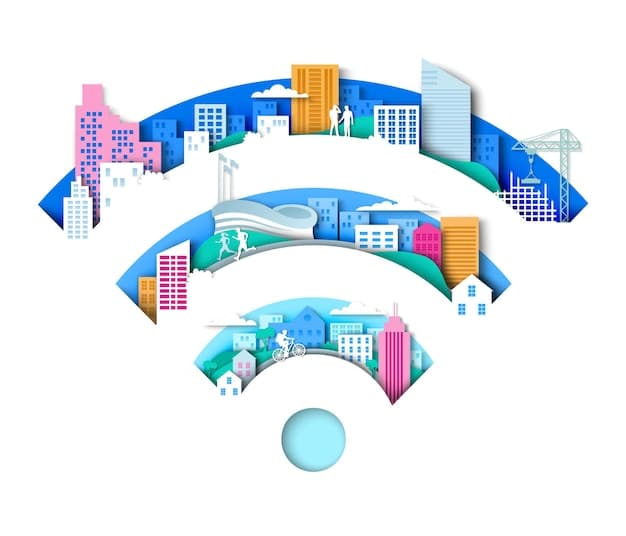How 5G Infrastructure Bill Will Impact US Tech Companies in 2025

The 5G Infrastructure Bill is poised to significantly impact US tech companies by 2025, influencing innovation, investment, and competition in the rapidly evolving technological landscape.
The implementation of the How Will the New 5G Infrastructure Bill Impact US Tech Companies in 2025? will reshape the operational environment for US tech companies, driving changes in network capabilities, cybersecurity protocols, and market strategies.
Understanding the 5G Infrastructure Bill
To grasp the implications of the new 5G Infrastructure Bill, it’s crucial to first understand its objectives and key provisions. The bill aims to accelerate the deployment of 5G technology across the United States, focusing on both urban and rural areas.
This acceleration involves substantial funding for infrastructure upgrades, spectrum allocation, and research and development. The goal is to enhance connectivity, promote innovation, and ensure that the US remains competitive in the global tech arena. Let’s dive deeper into the specifics of this game-changing bill.
Key Objectives of the Bill
The bill is designed to address several critical areas to support the growth of 5G infrastructure. Understanding these objectives helps in predicting the impact on tech companies.
- Expanding Coverage: Ensuring 5G availability in underserved rural communities.
- Promoting Innovation: Funding research and development for new 5G applications.
- Strengthening Security: Implementing cybersecurity measures to protect 5G networks.
- Enhancing Competition: Fostering a competitive market environment for telecom and tech companies.

These objectives are interconnected and aim to create a robust and secure 5G ecosystem. Now, let’s examine how these goals translate into tangible impacts on US tech companies by 2025.
Investment Opportunities for Tech Companies
The 5G Infrastructure Bill opens up significant investment opportunities for US tech companies. From network equipment manufacturing to software development, various sectors stand to benefit from the increased funding and focus on 5G technology.
Companies that are proactive in seizing these opportunities will likely gain a competitive edge. Let’s explore some of the specific areas where investment is expected to surge.
Network Equipment and Infrastructure
Manufacturers of network equipment, such as antennas, base stations, and fiber optic cables, will see increased demand as the 5G rollout accelerates. Companies that can efficiently produce and deploy these components will be well-positioned to capitalize on the bill’s investments.
This sector also includes companies specializing in software-defined networking (SDN) and network function virtualization (NFV), which are crucial for managing and optimizing 5G networks.
Software and Application Development
The 5G Infrastructure Bill is expected to boost the development of innovative applications that leverage the high speed and low latency of 5G networks. These applications span various industries, from healthcare to entertainment.
- Healthcare: Remote patient monitoring and robotic surgery.
- Manufacturing: Automation and real-time quality control.
- Entertainment: Augmented reality (AR) and virtual reality (VR) experiences.
- Transportation: Autonomous vehicles and smart traffic management.
Companies that can develop and deploy these applications will gain a competitive advantage in the rapidly expanding 5G market.
Cybersecurity Implications
With the increased deployment of 5G networks, cybersecurity becomes a paramount concern. The 5G Infrastructure Bill includes provisions to strengthen the security of these networks, creating both challenges and opportunities for tech companies.
Companies must adopt advanced security measures to protect against potential threats. Let’s delve into the specific cybersecurity implications and how companies can prepare.
Enhanced Security Protocols
The bill mandates the implementation of enhanced security protocols to address vulnerabilities in 5G networks. This includes measures to protect against data breaches, denial-of-service attacks, and other cyber threats.
Companies that can provide robust security solutions, such as encryption, intrusion detection systems, and threat intelligence services, will be in high demand.
Compliance Requirements
The 5G Infrastructure Bill also establishes compliance requirements for tech companies operating in the 5G space. These requirements aim to ensure that companies are adhering to best practices in cybersecurity.
- Regular Security Audits: Conducting periodic assessments to identify and address vulnerabilities.
- Data Protection Measures: Implementing encryption and access controls to protect sensitive data.
- Incident Response Plans: Developing strategies to respond to and mitigate cyber incidents.
Failure to comply with these requirements can result in significant penalties and reputational damage. Therefore, it’s crucial for companies to prioritize cybersecurity and invest in the necessary resources.

Impact on Competition
The 5G Infrastructure Bill aims to foster a competitive market environment for telecom and tech companies. This means encouraging innovation, reducing barriers to entry, and preventing anti-competitive practices.
The impact on competition will be multifaceted, affecting both large corporations and smaller startups. Let’s examine how the bill is likely to shape the competitive landscape.
Level Playing Field
The bill includes provisions to ensure that smaller companies and startups have an equal opportunity to participate in the 5G market. This involves providing access to spectrum, funding research and development, and promoting interoperability of different technologies.
By creating a level playing field, the bill aims to stimulate innovation and prevent larger companies from dominating the market.
Mergers and Acquisitions
The 5G Infrastructure Bill is likely to influence mergers and acquisitions in the tech and telecom industries. As companies seek to expand their capabilities and market share, they may pursue strategic acquisitions.
- Acquisitions of Smaller Companies: Larger companies acquiring smaller, innovative startups to gain access to new technologies.
- Mergers of Complementary Businesses: Companies with complementary capabilities merging to create stronger, more competitive entities.
Regulatory scrutiny will play a crucial role in ensuring that these transactions do not harm competition and that consumers continue to benefit from innovation and lower prices.
Challenges and Obstacles
While the 5G Infrastructure Bill presents numerous opportunities, it also poses significant challenges and obstacles for US tech companies. These challenges range from regulatory hurdles to supply chain disruptions and workforce shortages.
Companies must be prepared to navigate these obstacles in order to fully capitalize on the benefits of the bill. Let’s explore some of the key challenges in detail.
Regulatory Hurdles
Navigating the regulatory landscape can be complex and time-consuming. Tech companies must comply with a wide range of regulations related to spectrum allocation, environmental impact, and data privacy.
These regulatory hurdles can delay the deployment of 5G infrastructure and increase costs. Companies that can effectively manage these challenges will have a competitive advantage.
Supply Chain Disruptions
Global supply chain disruptions have become a major concern in recent years. These disruptions can impact the availability of critical components and materials needed for 5G infrastructure.
- Shortages of Semiconductors: Affecting the production of network equipment and devices.
- Delays in Shipping: Impacting the timely deployment of infrastructure.
Companies must build resilience into their supply chains by diversifying suppliers, stockpiling critical components, and investing in alternative sourcing strategies.
Preparing for 2025
As 2025 approaches, US tech companies must take proactive steps to prepare for the impact of the 5G Infrastructure Bill. This involves strategic planning, investment in new technologies, and workforce development.
Companies that are well-prepared will be best positioned to thrive in the evolving 5G landscape. Let’s outline some key strategies for preparing for the future.
Strategic Planning
Developing a clear strategic plan is essential for navigating the challenges and opportunities presented by the 5G Infrastructure Bill. This plan should include specific goals, timelines, and resource allocations.
Companies should also conduct scenario planning to anticipate potential changes in the market and regulatory environment. This will enable them to adapt quickly and effectively.
Workforce Development
Investing in workforce development is crucial for ensuring that companies have the skills and talent needed to succeed in the 5G era. This includes training existing employees and recruiting new talent with expertise in areas such as network engineering, cybersecurity, and software development.
- Training Programs: Offering courses and workshops to enhance employees’ technical skills.
- Partnerships with Universities: Collaborating with academic institutions to develop specialized programs in 5G technologies.
- Recruitment Strategies: Attracting top talent through competitive compensation and benefits packages.
By building a skilled workforce, companies can drive innovation and maintain a competitive edge in the 5G market.
| Key Aspect | Brief Description |
|---|---|
| 🚀 Infrastructure Expansion | The bill accelerates 5G deployment nationwide, especially in rural areas. |
| 🛡️ Cybersecurity Measures | Enhanced protocols protect 5G networks from cyber threats and data breaches. |
| 🤝 Competitive Landscape | Aims to foster competition, enabling smaller companies to compete. |
| 💰 Investment Opportunities | New avenues for investment in network equipment, software, and applications. |
Frequently Asked Questions
▼
The primary objective of the bill is to accelerate the deployment of 5G technology across the US, ensuring widespread access and promoting innovation in the sector.
▼
The bill mandates enhanced security protocols to protect 5G networks from cyber threats, fostering a more secure environment for data transmission and network operations.
▼
The bill creates chances to invest in network equipment, software development, and innovative applications capitalizing on 5G’s high speed and low latency capabilities.
▼
It aims to level the playing field by reducing barriers to entry and providing resources for smaller companies to compete with larger corporations in the 5G market.
▼
Companies may face many regulatory hurdles, supply chain disruptions, and workforce shortages as they work to implement the guidelines and regulations of the bill.
Conclusion
The 5G Infrastructure Bill is poised to reshape the landscape for US tech companies by 2025. By understanding its key provisions, investment opportunities, and potential challenges, companies can strategically position themselves to thrive in the evolving 5G ecosystem. The bill’s emphasis on innovation, security, and competition will drive significant changes, creating both opportunities and challenges for businesses across the tech sector.





